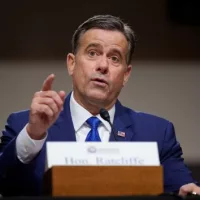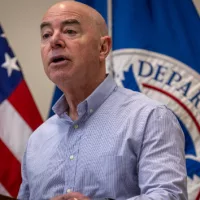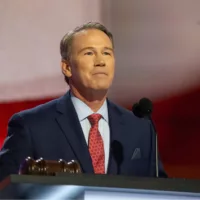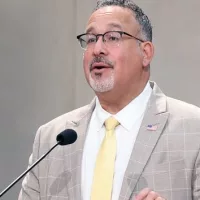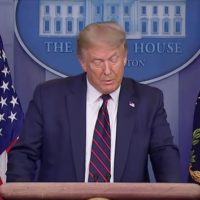
ABC NewsBY: JORDYN PHELPS and BEN GITTLESON, ABC News
(WASHINGTON) — In a historic signing ceremony hosted by President Donald Trump at the White House, the United Arab Emirates and Bahrain on Tuesday became the third and fourth Arab nations to move toward establishing full diplomatic relations with Israel.
“We’re here this afternoon to change the course of history,” Trump said, speaking from the South Lawn of the White House ahead of the signing, presenting himself as a diplomat and dealmaker weeks ahead of the election. “After decades of division and conflict we mark the dawn of a new Middle East.”
Representatives for Israel, the United Arab Emirates and Bahrain similarly heralded the historic nature of the agreements between their countries, making slight nods to the absent Palestinians and using soaring rhetoric to portray the dawn of a new era in the Middle East.
Israeli Prime Minister Benjamin Netanyahu presented himself as a peacemaker while speaking about strength, declaring “this day is a pivot of history. It heralds a new dawn of peace.”
“This peace will eventually expand to include other Arab states and, ultimately, it can end the Arab-Israeli conflict once and for all,” Netanyahu said.
Emirati Foreign Minister Sheikh Abdullah bin Zayed Al Nahyan, the crown prince of Abu Dhabi’s brother, spoke next — addressing Netanyahu.
“Thank you for choosing peace and for halting the annexation of Palestinian territories, a position that reinforces our shared will to achieve better future for generations to come,” he said. Israel, though, has only agreed to the suspension of its plans to annex land.
Bahrain’s foreign minister, Sheikh Khalid bin Ahmed Al Khalifa, said “today’s agreement is an important first step and it is now incumbent on us to work urgently and actively to bring about the lasting peace and security our people deserve.”
The four men then signed copies of several documents: one between Israel and the UAE described by an announcer as “a treaty of peace, diplomatic relations, and full normalization,” another between Israel and Bahrain described as a “declaration of peace,” and a third that all four signed described as the “Abraham Accords,” a name used by the White House in reference to the patriarch of Judaism, Islam and Christianity.
Trump’s signatures on the bilateral agreements amounted to a “witness or observer” signature, a senior administration official said Thursday. The White House has not released the texts of any of the documents or described what exactly was in the one called the “Abraham Accords.”
For all the significance of Tuesday’s signings, former Middle East peace negotiator Dennis Ross said they are more “symbolic” than substantive, noting that the parties did not sign “full-fledged peace treat[ies]” and that many of the substantive details of the agreements still have to be negotiated.
Ross further cautioned against an “apples-to-oranges” comparison in equating Tuesday’s deals with Israel’s two prior historic agreements normalizing relations with Jordan and Egypt, which he said were much more difficult to achieve.
“Those were countries that fought wars with Israel. These are not countries that have fought wars with Israel, these are countries that don’t have a common border with Israel and have never taken part in past conflicts,” Ross, who served as a senior adviser to former President Barack Obama said.
Speaking from the Oval Office ahead of the signing ceremony, Trump claimed that the US is “very far down the road” in closing similar deals with an additional five or six other countries.
“Many of them and they’re going to be coming along,” Trump said. He said some will come along “before the election perhaps, but a lot of them after.”
Tuesday’s signing comes just a little over a month since the president announced that the U.S. had helped to strike a deal between Israel and UAE last month, and Bahrain followed suit last week.
Coming fewer than two months before Election Day, the timing of the agreements was politically opportune for Trump as he looks to showcase a foreign policy achievement as he seeks a second term in the White House.
Jon Alterman, the director of the Middle East Program at the Center for Strategic and International Studies, said that the agreements are the culmination of years of patient diplomacy that date back to the Obama administration but that the Emirates have been in the “driver’s seat” in closing a deal at a moment when both the US and Israel wanted a political victory.
“The administration really wants the deal, because they’re concerned about politics. The Israelis really want the deal. So give them what they really want to get what you want and then continue to negotiate to get more,” Alterman said.
While the deals represent a win for the parties involved, it comes as a loss to the Palestinians, who view the deal by Arab nations to engage with Israel as a betrayal to the cause of Palestinian statehood.
“It sends a message to the Palestinians that other countries in the region, they’re going to put their own national interests first, not that they don’t care about Palestinians, but they’re gonna put their national interests first,” Ross said.
While Trump hopes of achieving what he has coined the “ultimate deal” in the form of an Israeli-Palestinian peace agreement remains a distant prospect, Kushner went so far as to contend that the new agreement “signals the end, we believe, of the Arab-Israeli conflict” in an interview on ABC’s “Good Morning America” on Tuesday.
“There’s still a lot more work to do but for 70 years in the region you’ve had the Arab countries not wanting to interact with Israel in a substantive way,” Kushner said, making the case that the engagement represents a new chance for peace in the region.
“It is not the end of the conflict between the Israeli and the Palestinians. The Palestinians are calling this a betrayal. Are their hopes for a state now dead?” ABC News’ Chief anchor George Stephanopoulos followed up.
“No, look, I think there is a lot of posture. In deals, everyone is at no until there’s a yes. I think what you’re seeing is tremendous movement. They were caught by surprise by this. The Arab countries want to focus on their citizens and want them to have better lives and are tired of waiting for the Palestinians to not be practical and make a deal. President Trump is a dealmaker,” Kushner responded. “At some point when they decide they want to live better lives I believe they’ll engage.”
Copyright © 2020, ABC Audio. All rights reserved.






